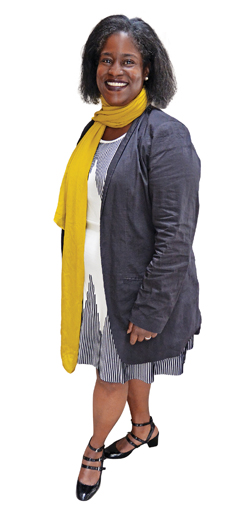Founded in 1986 by Charles F. Harris, Amistad Press is one of the country’s leading publishers of multicultural voices. Originally established to publish anthologies of African American writing, Amistad has since grown into a prominent literary fiction and nonfiction imprint of HarperCollins, having published novels by Edward P. Jones, Yvvette Edwards, and Jacqueline Woodson, as well as books of nonfiction by cultural icons such as Steve Harvey and Venus Williams. As Amistad celebrates its thirtieth anniversary, Tracy Sherrod, who has served as the editorial director since 2013, talks about the press’s history and the challenges it faces today.
 How has Amistad changed or grown in the past thirty years?
How has Amistad changed or grown in the past thirty years?
It’s grown in the number of titles, it’s grown in prominence, it’s grown in respectability, it’s grown in creativity. The foundation is the same, which is to publish multicultural voices and to let them express themselves freely. At the time when Charles F. Harris started Amistad, you didn’t feel that the publishing industry could fully see black culture. When Susan L. Taylor’s essay collection In the Spirit came—Taylor was the editor in chief of Essence—people in the publishing industry didn’t recognize how popular she was, so she was rejected all over town. But Malaika Adero, who came to Amistad as its first official editor outside of Charles Harris, acquired that book and it sold in best-seller numbers. And then they followed it up a few years later with a book by John Johnson, who founded Ebony and Jet. These people were praised in our community and celebrated—we all knew their names, we all wanted to know their stories—and Amistad published them. That’s how Amistad has impacted publishing: by helping the industry recognize how important and profitable these voices are.
What are the challenges for Amistad now?
Nowadays, people in the industry recognize how important African American voices are in contributing to literature. The authors can be published by any imprint they choose, so that makes it more competitive on my part. It’s always been competitive, but not this competitive. I’m glad to see it. There should be huge demand for those voices.
Do you find authors are reluctant to join Amistad as opposed to an imprint that doesn’t have a multicultural focus?
I find both. I find authors who prefer the focus, who have been published elsewhere and have maybe felt “culturally assaulted” by their editors—that’s one way a writer described what happened to her in the editorial process. And there are authors who are perfectly happy where they are and are published brilliantly where they are. Some writers are reluctant and ask me to publish their book on the broader Harper list. But we have the same marketing and publicity team, so I don’t think the logo on the book makes much of a difference.
Do you think publishers run the risk of pigeonholing or sequestering writers by creating multicultural imprints?
No, I don’t think there’s a risk of doing that. It’s been proved that when Random House closed down One World/Ballantine and Harlem Moon, the company as a whole published less work by multicultural voices. So I don’t think that they’re sequestered—it’s an opportunity. Some people see it as ghettoized. But that’s not the case at all—these books are published with great care, they’re given the same marketing and publicity opportunities, we offer the same competitive advances.
Amistad publishes both literary and commercial titles—how do you balance the two?
I go with my taste. I think every editor acquires to her personality, and I have a broad range of interest. I’m really trying to do books that address the community’s needs—depression and emotional issues are heavy on people’s minds these days with the economy. We published Darryl McDaniel’s book, Ten Ways Not To Commit Suicide. Since it’s by someone who’s rich and obviously successful—but who also suffers with depression from time to time—it might make the layperson feel more comfortable coming forth and talking about these issues. We also published this book The Mother by Yvvette Edwards and it’s delicious, let me tell you, but delicious in the sense that it’s rich in the pain the mother feels after her son is killed by another child. And I think that’s an issue in our community. That’s what I mean by publishing to the issues—things that are very particular to us. Not too particular to us, but something we’re dealing with in overabundance.
Can you speak more to what issues are important now?
Financial issues, the economy. I’ve published several books that allow people to inspire their creativity to become entrepreneurs. Like Miko Branch’s Miss Jessie’s: Creating a Successful Business From Scratch—Naturally. And some of our memoirs have practical elements that you can take away, like The Book of Luke: My Fight for Truth, Justice, and Liberty City by Luther Campbell. In his book, he writes about how he made a financially successful life for himself, ran all the way to the Supreme Court to fight injustice against the first amendment, and won. I think that’s pretty incredible. He shares with people that you need to stand for something and you need to work hard. And a lot of the memoirs we publish have that theme running through them: entrepreneurship, hard work, and the use of your God-given talents.
What as an editor do you find most challenging?
There comes moments in one’s publishing career—or in one’s publishing day, week, month—where a book will come along and you’ll feel like you need to acquire it, because it’s going to be extremely popular and sell really well. It’s only once in a while that you’re going to say, “This one is the one. This one is going to work.” And a lot of times if the people around you don’t know that person’s name in the same way that they didn’t know Susan Taylor’s name, the same way they didn’t know Zane’s name, they’ll say, “Oh no, we can’t do that book. We’re not going to invest much of an advance in that book.” Those moments are painful, because I know—sometimes you know—you’re not guessing, you’re not estimating. Once in a while you know. And I need to work better at conveying when I know, so that those books don’t end up with another publisher.








